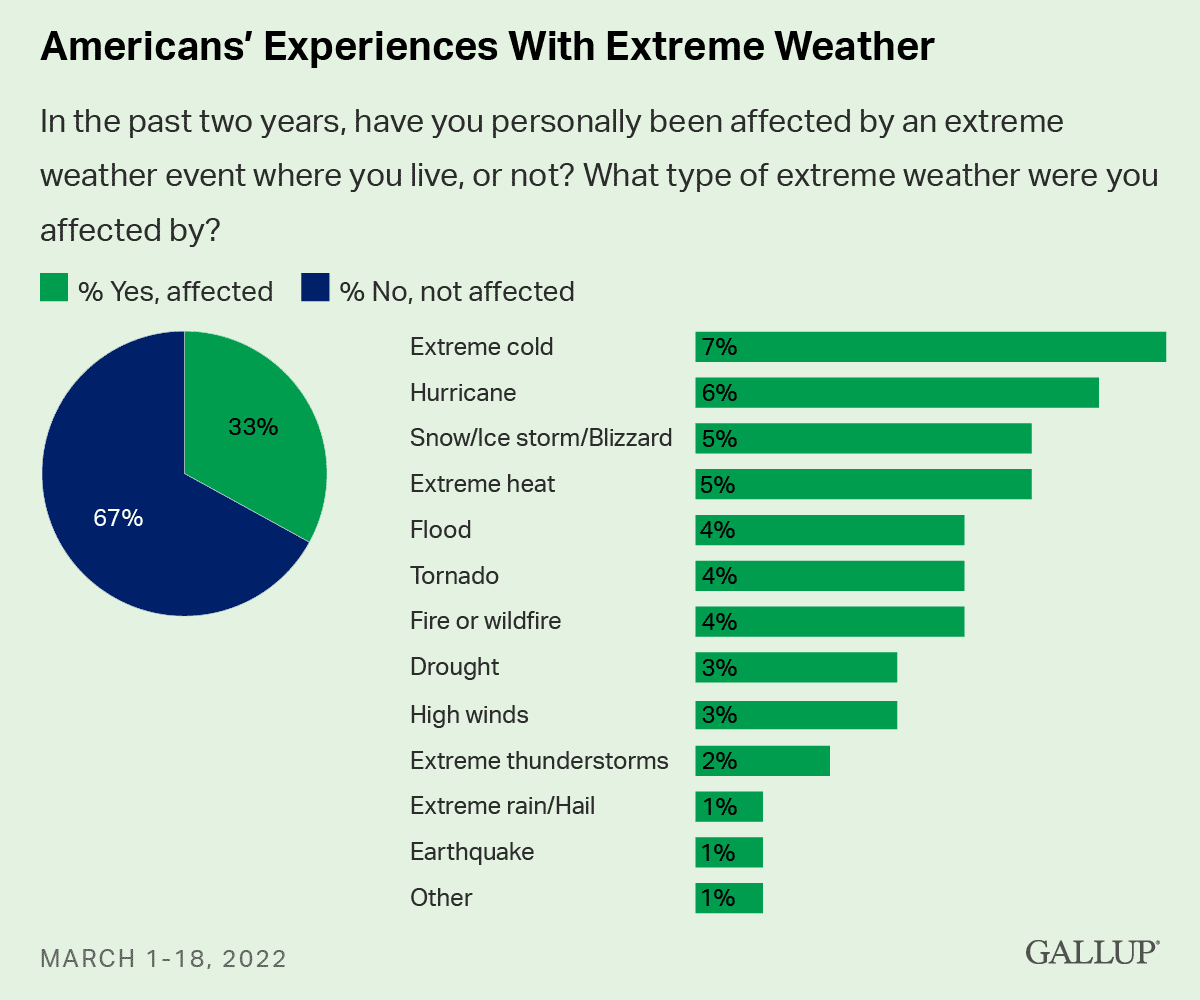Sept. 21, 2022
This is Gallup Reporter Resources, a comprehensive compilation of all Gallup findings on the issue of the day, edited by Justin McCarthy.
Not a subscriber? Sign up today.
Fall might not be as cool and crisp as many remember it to be. Accuweather forecasters predict a warm season, perhaps fitting as Climate Week NYC kicks off Sept. 19.
Later this fall, the annual United Nations climate summit will take place -- hosted this year in Egypt -- where developed countries' responsibility for compensation to developing countries for climate-related damages is expected to be discussed.
The summit will take place on the heels of the devastating floods in Pakistan, which took more than a thousand lives, including hundreds of children. Limited access to clean drinking water since the floods has led to an increase in diseases in the country. An August 2022 Nature Climate Change study finds that most known pathogenic diseases have been aggravated by climate events.
News reporting like yours is critical to the world's understanding of climate and environmental issues.
We're here to help and have a variety of resources available to enrich your coverage through global insights on the issue since the 1980s.
Rising temperatures are taking a toll on people across the world -- and the future looks bleak.
A new analysis from Gallup -- published in collaboration with Citi -- represents the first step toward quantifying the toll that rising temperatures may have on global populations and, more specifically, on vulnerable communities. The implications are alarming.
Every year, Gallup asks people worldwide to rate their lives through its World Poll. For this analysis, researchers examined 13 years of World Poll data on people's life evaluations using geospatial information on 1.75 million survey respondents in 160 countries and 30 years of daily high-resolution temperature data from NASA.
Gallup used the NASA data to map local temperatures in the 30 days before each survey interaction to understand how exposure to high-temperature days -- days identified as outliers to the seasonal norm -- affected people's ratings of their lives.
Given current climate projections, high-temperature days could decrease life evaluations by an estimated 17% by 2030.
Using observed heat trends from the past 14 years to predict the global rise in high-temperature days over the next decade, the results suggest people will experience, on average, 3.1 such days in 2030, compared with 1.7 days in 2021. The cumulative effect of such days implies that, holding all else constant, rising temperatures will be associated with a drop in life evaluations three times greater in 2030 than in 2020.
Rising temperatures correspond with a drop in people's wellbeing.
Each time a person experiences a high-temperature day, their life evaluation drops by an average of 0.56%. Globally, people faced three times more high-temperature days in 2020 than in 2008, and people's ratings of their lives dropped by 6.5%, controlling for location and other factors known to influence people's life evaluations.
This 6.5% is a meaningful decrease, considering that life evaluation has been a relatively stable measure since Gallup started tracking it.
Rising temperatures have a more obvious effect on older generations and people in poorer economies and in developing economies such as China and Brazil.
The analysis shows a more pronounced effect of rising temperatures on already-vulnerable demographic groups -- namely, people aged 65 and older as well as those with lower levels of education.
Significant negative relationships between high-temperature days and life evaluation were seen individually in several of the world's most populated countries, including China, Turkiye, Brazil, Nigeria and Mexico.
Read the Gallup-Citi Climate Change and Wellbeing Around the World report.
How are people across the world reacting to climate change?
About four in 10 of the world's residents say climate change poses a "very serious" threat to people in their country in the coming two decades.
A 2019 study with Lloyd's Register Foundation found that, across the world, 41% of people say that climate change poses a "very serious" threat to people in their country in the next 20 years, and another 28% said it poses a "somewhat serious" threat. About one in eight (13%) said it is "not a threat at all."
Views of climate change as a very serious threat vary widely across regions. But most people -- at least 60% -- in every region say climate change is a somewhat serious or very serious threat to people in their country in the next 20 years. People in Southern Europe and the Latin America and Caribbean region are the most likely to say climate change is a very serious threat to people in their country, with more than seven in 10 people (73% and 71%, respectively) expressing this opinion in each region.
Brazilians and Russians are widely dissatisfied with their countries' environmental efforts.
While most people worldwide (63%) are pleased with the efforts in their respective countries to preserve the environment, not everyone is this content.
Among the top emitters, people are most unhappy in Brazil and Russia, whose leaders opted not to attend the 2021 U.N. summit in person. Reflecting Brazil's recent track record on the environment, Brazilians' dissatisfaction with their country's environmental efforts soared to a new high of 78% in 2020. And in Russia, which has been criticized abroad for doing too little to fight climate change, 65% were dissatisfied as recently as 2021.
Both Brazil and Russia made new promises at COP26, but it remains to be seen if they will change any minds at home.
Before the recent heat wave, dissatisfaction with environmental efforts was the majority view in the U.K., Spain and Greece.
Record-high temperatures and wildfires wracked the United Kingdom and countries across the European Union over the summer. Before the heat wave, a slim majority of Britons (51%) surveyed in 2021 were dissatisfied with the country's efforts to preserve the environment. This marked the first time in Gallup's 16-year trend that this percentage topped 50%.
In Spain and Greece, which were ravaged by wildfires over the summer, majorities of Spaniards (58%) and Greeks (69%) were dissatisfied with their respective countries' environmental efforts.
How resilient is the world to natural disasters?
Resilience refers to people's ability to handle the difficulties they face in their lives. Global hazards like climate change-induced severe weather events highlight the need for coordinated action to build resilience among the world's most vulnerable populations.
The 2021 Lloyd's Register Foundation World Risk Poll included a wide range of indicators gauging the ability of people and communities to handle disasters arising from natural hazards and other forms of adversity. The study polled 125,911 people in 121 countries and territories across all global regions.
The poll included questions on people's recent experiences with disasters arising from natural hazards. The results highlight areas where resilience is most needed, including those where it may currently be lacking.
Learn more about the World Risk Poll 2021: A Resilient World? report.
More than one in four adults worldwide have experienced a disaster caused by some type of natural hazard in the past five years.
Globally, 27% of people said they have experienced a disaster caused by some type of natural hazard in the past five years. Flooding or heavy rains were the most common cause of hazard, named by 10% worldwide, followed by hurricanes or cyclones (7%) and earthquakes (5%).
Experiences with natural disasters are most common in the Middle East and Southeastern Asia.
In two regions -- the Middle East and Southeastern Asia -- more than a third of people (36% in each region) said they have experienced a disaster from a natural hazard of any type in the past five years. Earthquakes were the most commonly named cause in the Middle East, while floods, cyclones and earthquakes were all commonly named in Southeastern Asia.
A small majority of people across the world said their families are well-prepared for disasters.
Fifty-four percent of adults worldwide said they and their families are well-prepared to deal with a disaster. This figure ranged from at least two-thirds in Southern Asia (71%), Northern America (69%), Australia/New Zealand (68%) and Southeastern Asia (66%) to less than one-third in Central/Western Africa (29%), Latin America/Caribbean (29%), Northern Africa (27%) and Southern Africa (27%).
Local news is the most trusted source to provide information about disasters.
When asked which source they trust most to provide information about possible disasters, 31% of people globally cited local news media, followed by their country's national weather service (16%) and the internet or social media (15%). People in lower-income countries are most likely to rely on local news media.
The least resilient populations are more likely to have experienced disasters.
On average, countries and territories where people are more likely to have experienced disasters have lower resilience scores. People in the region with the worst resilience score -- Central/Western Africa -- were most likely to say they have experienced a disaster from flooding, at 17%.
Though a high percentage of Southern Asians (71%) said they are well-prepared to deal with a disaster, the region's Resilience Index score was modest at 0.51, suggesting many in the region may be more confident in their ability to handle disasters than their circumstances warrant.
Those who have experienced natural disasters are more likely to view climate change as a serious threat.
People who have experienced disasters from natural hazards are more likely than those who have not to view climate change as a "very" or "somewhat serious" threat to their country -- 74% vs. 65%, respectively. Those who have experienced droughts or wildfires are most likely to say climate change is a very serious threat.
Learn more about the World Risk Poll 2021: A Resilient World? report.
What are Americans' attitudes toward the climate crisis?
U.S. worries about the state of the environment have been elevated in recent years.
For the seventh straight year, U.S. public concern about the quality of the environment is near its two-decade high, with 44% of Americans worrying "a great deal" about it. The recent stretch of elevated public concern about the environment contrasts with more muted worry in the first 15 years after Gallup began tracking this public sentiment in 2001.
Another sign of Americans' heightened concern about environmental quality comes from the recent increase in those describing the quality of the environment as "poor." This has risen from 9% in 2015 to 18% today.
Meanwhile, when asked about the direction in which the quality of the environment is trending, more Americans have consistently perceived conditions to be getting worse rather than better.
One in three Americans have been affected by an extreme weather event in the past two years.
Thirty-three percent of U.S. adults report they have been personally affected by an extreme weather event in the past two years. Most commonly, they report experiencing extreme cold (7%), hurricanes (6%), or snow, ice storms or blizzards (5%).
Residents of the South (39%) and West (35%) are significantly more likely than those living in the East (24%) and Midwest (27%) to say they have recently experienced an extreme weather event.

Those who have experienced extreme weather worry more about climate change and are more likely to view it as a threat.
Sixty-three percent of those who have been affected by extreme weather worry "a great deal" about global warming or climate change, compared with 33% who have not been affected.
Nearly eight in 10 extreme-weather victims, 78%, believe the effects of global warming have already begun, compared with 51% of nonvictims. Sixty-four percent of victims and 36% of nonvictims say global warming will pose a serious threat to their way of life during their lifetime.
To some degree, these differences in attitudes reflect that Democrats, who tend to be more likely to express concern about climate change, are also more likely than Republicans to say they have been the victim of extreme weather, 45% to 20%.
However, even when respondents' partisanship is taken into account, victims of extreme weather are more likely than nonvictims to express concern about climate change. In most cases, there is a double-digit gap in climate-change attitudes between victims and nonvictims within each party group.
Young Republicans are more worried than their GOP elders about the environment.
An in-depth analysis of Gallup data finds that while less than one-quarter of Republicans worry "a great deal" about the quality of the environment, those aged 18 to 34 are significantly more worried than older Republicans.
Worry about the quality of the environment among the youngest group of Republicans has consistently outpaced that of the oldest group since 2001. The latest gap in worry between those aged 18 to 34 and those 55 and older is the largest yet.
Americans are most worried about water pollution.
In terms of which environmental issues Americans worry about, Gallup finds pollution of drinking water (56%) and pollution of natural waterways (53%) at the top of the list.
Less than half of Americans worry "a great deal" about climate change (43%), extinction of plant and animal species (40%), air pollution (41%), and loss of tropical rainforests (45%).
The public's level of worry has ebbed and flowed in tandem across the six environmental threats over the past 21 years. Although degrees of worry have shifted over time, the rank order has remained largely consistent, with water pollution outpacing all other threats.
Policies to address greenhouse gas emissions and climate change enjoy broad public support.
Americans widely favor each of six proposals designed to limit greenhouse gas emissions that contribute to climate change. Support ranges from 59% in favor of spending federal money for building more electric vehicle charging stations in the U.S. up to 89% for providing tax credits to Americans who install clean energy systems in their homes.
The March 2022 survey addressed the political controversy over climate change policies by asking respondents to weigh the possible economic risk of passing legislation to limit greenhouse gas emissions against the risk to the environment of not passing it. In contrast to the broad support found for the individual items, a smaller 53% say they are more concerned about the risk to the environment of not passing such proposals, while 43% are more concerned about the potential harm to the economy and deficit if they are passed.
Americans generally prioritize environmental protection over economic growth.
A small majority of Americans (53%) say protecting the environment is the greater priority, and 42% say economic growth is.
Gallup has posed this environment versus economy tradeoff question frequently since 1984. Americans have almost always prioritized the environment, but in weaker economic times, they have been less likely to do so. Between 2009 and 2013, when the U.S. was emerging from the Great Recession, Americans were more likely to say economic growth should be the greater priority. The lone exception during this time came in May 2010, after a major oil spill in the Gulf of Mexico.
Republicans and Democrats differ greatly as to whether they give more precedence to the environment or the economy.
The public is split on whether nuclear energy should be a source of electricity in the U.S.
Fifty-one percent of Americans "strongly" or "somewhat favor" the use of nuclear energy as one of the ways to provide electricity for the U.S., while 47% are opposed.
Americans' relatively limited support for nuclear energy in recent years contrasts with more solid backing from 2004 to 2015. Support for nuclear energy then was higher than it is now.
Democrats continue to be far less likely than Republicans to favor using nuclear energy. Support is also higher among men than women and higher among those with more rather than less formal education.
Americans are more worried about the energy situation in the U.S. than they have been in a decade.
Nearly half of Americans, 47%, say they worry a great deal about the availability and affordability of energy. This is up from 37% a year ago and is more than double the percentage in 2020, when energy concern was at its low point in Gallup's trend. Americans have expressed similar levels of concern about energy in the past, including in 2001, 2006 through 2008, 2011 and 2012.
Additionally, 44% of Americans describe the energy situation in the U.S. as "very serious," with 46% identifying it as "fairly serious."
The public is divided over whether protecting the environment or developing new energy supplies should be the nation's priority.
Americans are about as likely to say environmental protection should be given higher priority (50%) as to say energy production should (46%).
Since 2001, Americans have typically prioritized environmental protection more than energy production. However, the gap in favor of the environment has usually narrowed when energy concerns were greater.
Read/Listen to additional analyses on climate issues:
Lt. Gen. Russel Honore on Climate Change and Rise of China (The Gallup Podcast): Every generation deals with a significant war, according to Lt. Gen. Russel Honore. The next generation's will be population growth, finding solutions to pollution and navigating relations with China.
A Crisis Within a Crisis: Water Scarcity Amid COVID-19 (The Gallup Podcast): Water insecurity has been a major problem for communities across the world and has been exacerbated by the COVID-19 pandemic. Sera Young, associate professor at Northwestern University, joined the podcast to unpack the wide-ranging impacts that water scarcity has, even in first-world nations.
Americans Support ESG Objectives but Unfamiliar With Term: "Most Americans are not familiar with the term 'environmental, social and governance' (ESG), but the principles behind it resonate with them," write Gallup's Mohamed Younis and Lydia Saad. "Majorities of U.S. adults say that how well companies promote certain environmental and social goals, as well as whether they engage in good corporate governance, matters to them when choosing which companies to buy from."
Arizona Survey Finds Consensus in Politically Divided State: "Arizona faces a number of specific environmental pressures related to climate change and the state's rapid population growth. Arizonans broadly support a number of goals in response to such challenges, including actions to protect rural water supplies, prevent forest fires and reduce heat islands (places where infrastructure such as buildings and roads absorb and re-emit the sun's heat) in urban and rural areas," writes Gallup Senior Editor and Research Analyst Steve Crabtree. "All three actions are rated 'very important' or 'important' by at least three-fourths of Republicans, Democrats and independents."
The Gallup Vault: Relatively few U.S. communities had recycling requirements in the late 1980s.
More from the Gallup Vault:
Keep these important resources on hand.
- Historical trends on the environment: This page contains U.S. public opinion trends on the environment and climate, dating as far back as 1984. Views on climate change, priorities for protecting the environment and more can be found here.
- Gallup content archives on the environment: Access Gallup content on environmental issues dating back to 2008, including all articles, Q&As, podcast interviews and more.
Want to talk? Our experts are available to speak with you.
“While there is a lot of robust evidence of the environmental and economic costs of rising temperatures, little is known about the actual human toll. Gallup has shown how people who experienced extreme heat also reported a decrease in their sense of wellbeing. This is an important milestone toward quantifying more accurately the true impact of climate change on people's lives.” -- Benedicte Clouet, Sustainability Practice Lead
“The water crisis in Mississippi is the worst-case scenario of what many Americans have expressed great concern about for decades. In a list of environmental issues, the public has consistently reported the greatest level of worry about pollution of drinking water as well as U.S. waterways.” -- Mohamed Younis, Editor-in-Chief
Contact mediainquiry@gallup.com to schedule interviews with our experts.



